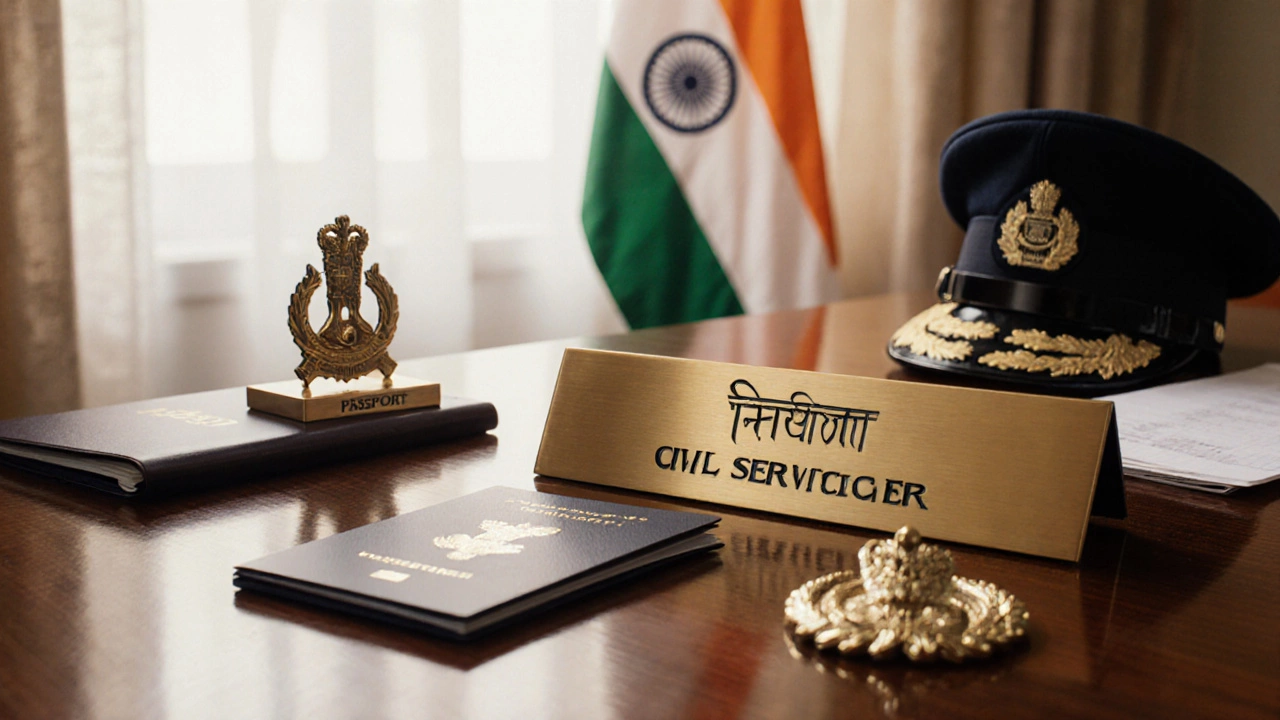
Government Salary Calculator
Calculate Your Total Compensation
Estimate your annual earnings for high-paying government jobs in India based on basic pay and allowances.
When people ask “Which government job is best for money?”, they’re really hunting for the high paying government jobs that combine solid salaries, allowances, and long‑term security.
Government jobs are positions offered by central, state, or local authorities that provide a stable income, retirement benefits, and often a clear promotion ladder. In India, the pay structure is largely driven by the 7th Pay Commission, with additional allowances based on posting, risk, and rank.
How to Evaluate a Government Job’s Earnings
Before you chase a title, break down the compensation into four components:
- Basic Pay: The fixed amount that appears in the pay‑commission tables. It determines your grade pay and is the baseline for most deductions.
- Allowances: Housing, dearness, transport, and special duty allowances can add 30‑70% on top of the basic.
- Increment & Promotion: Annual increments (about 3% of basic) and periodic promotions that bump you to a higher pay level.
- Retirement & Perks: Pension calculated on the average of the last 10 basic pay draws, medical facilities, and canteen subsidies.
By converting each component to a yearly figure, you can compare jobs that look very different on paper.
Top 5 Highest‑Earned Government Careers (2025)
| Job | Starting Basic Pay (₹) | Typical Allowances (%) | First Promotion (₹) | Exam Body | Eligibility Age |
|---|---|---|---|---|---|
| Indian Administrative Service (IAS) | 56,100 | 45‑70 | 1,20,000 | UPSC | 21‑32 |
| Indian Police Service (IPS) | 56,100 | 40‑65 | 1,10,000 | UPSC | 21‑32 |
| Indian Foreign Service (IFS) | 56,100 | 55‑80 (postings abroad) | 1,15,000 | UPSC | 21‑32 |
| Indian Revenue Service (IRS) | 56,100 | 35‑60 | 1,05,000 | UPSC | 21‑32 |
| Indian Defence Services (Army, Navy, Air Force) | 56,100 (Lieutenant/Junior Commissioned Officer) | 30‑70 (risk & field allowances) | 1,00,000 | UPSC/Defence Exams | 18‑27 |
Career Deep‑Dive
Indian Administrative Service (IAS)
The IAS sits at the top of the civil service hierarchy. Officers start as Sub‑Collectors or Assistant Commissioners and quickly move to District Magistrate roles. The role offers the highest mix of decision‑making power, exposure, and salary. On top of the basic pay, an IAS officer receives house rent allowance (HRA) up to 24% of basic (or actual rent in metros), a dearness allowance (currently 17% of basic), and a range of special allowances for travel, security, and deputation.
Preparation tip: The UPSC Civil Services Examination (CSE) is the gateway. Focus on NCERT basics for the Preliminary stage, then build a robust optional subject strategy for the Mains. Allocate at least 6‑8 months for each phase, and solve at least 2‑3 full‑length mock tests per week in the final three months.
Indian Police Service (IPS)
IPS officers command law‑enforcement agencies at the state and central level. The starting pay mirrors the IAS, but the allowance profile differs: a risk allowance (up to 30% of basic) and a uniform allowance. Career progression often sees postings as Superintendent of Police, then Deputy Inspector General, and eventually Director General of Police.
Preparation tip: Alongside the same UPSC CSE, add a strong emphasis on current affairs, especially crime, law, and public order. Physical fitness is mandatory; maintain a regular workout routine while studying.
Indian Foreign Service (IFS)
IFS officers represent India abroad, handling diplomatic negotiations, trade agreements, and cultural exchanges. The salary structure is similar to the IAS, but overseas postings bring additional “hardship” and “grant-in-aid” allowances that can push total compensation above ₹25 lakhs per annum for senior diplomats.
Preparation tip: The UPSC CSE remains the entry point, but focus on optional subjects like International Relations, Political Science, or History. Enhance language skills-French, Spanish, or Arabic are valuable for postings.
Indian Revenue Service (IRS)
IRS officers manage tax collection, customs, and indirect tax enforcement. Their allowances include a specific “tax deduction” allowance and, for senior officers, a city compensatory allowance. The job offers a clear financial trajectory, especially after reaching the rank of Commissioner.
Preparation tip: Aside from the UPSC CSE, brush up on economics, finance, and accounting fundamentals. Mock exams featuring tax case studies are a plus.
Indian Defence Services
Commissioned officers in the Army, Navy, and Air Force start at the rank of Lieutenant (or equivalent). Besides the basic pay, they receive a host of allowances: risk, field, transport, and a special service pension after 20 years. Promotion to Major/Commander or higher brings pay levels comparable to senior civil servants.
Preparation tip: Clear the NDA (National Defence Academy) or CDS (Combined Defence Services) exam, followed by SSB interviews. Physical conditioning, team‑work drills, and a solid grasp of General Knowledge are non‑negotiable.

Preparation Roadmap for These High‑Paying Jobs
- Identify the Exam Body: Most top salaries come from UPSC (IAS, IPS, IFS, IRS) or Defence exams (NDA, CDS). Note the specific application windows.
- Map Eligibility: Age, education, and physical standards differ. Create a spreadsheet to track each requirement.
- Choose a Core Study Material Set: NCERTs (Class 6‑12) for basics, then standard reference books (Laxmikanth for Polity, Singh for History, etc.).
- Build a Timeline: Allocate 8‑10 months for prelims, 6 months for mains, and 2 months for interview preparation. Insert monthly mock tests.
- Develop Optional Subject Expertise: Pick an optional that aligns with your graduation degree or interests to save time.
- Physical & Personality Prep: For IPS and Defence services, schedule regular fitness sessions and mock interviews.
- Stay Updated: Subscribe to a daily current‑affairs brief, and follow a reliable newspaper (The Hindu, Indian Express).
- Join a Test‑Series Platform: Platforms like ClearIAS or Vision IAS provide analytics on your strengths and weaknesses.
- Review & Refine: In the final 30 days, focus on answer writing practice, mock interviews, and revising high‑yield notes.
Common Pitfalls and How to Avoid Them
- Skipping the basics: Many aspirants jump straight to advanced books and miss the foundational concepts tested in prelims.
- Neglecting health: Long study hours lead to burnout; schedule short breaks, exercise, and sleep 7‑8 hours.
- Over‑reliance on a single source: Cross‑verify facts; use at least two textbooks for each subject.
- Ignoring the interview: The final selection often hinges on personality; practice mock interviews weekly.
- Under‑estimating allowances: Some candidates compare only basic pay and miss out on high‑value allowances like HRA, transport, and risk.

Quick Checklist Before You Start
- Confirmed eligibility (age, education, physical) for the target job?
- Have you downloaded the latest UPSC/Defense notification?
- Created a month‑by‑month study plan with mock test dates?
- Signed up for a reputable test‑series platform?
- Set up a fitness regimen (if applicable) and a daily current‑affairs routine?
Frequently Asked Questions
Which government job pays the most after the first promotion?
The IAS typically leads in total compensation after the first promotion, thanks to higher allowances (HRA, dearness, and special duty) that can push the annual take‑home beyond ₹25‑30 lakhs.
Do I need a graduate degree to appear for UPSC?
Yes. The UPSC Civil Services Examination requires at least a bachelor's degree from a recognized university.
How much does a Bank PO earn compared to an IAS?
A Bank Probationary Officer starts with a basic pay of around ₹56,100, but total earnings (including DA, HRA, and performance bonuses) usually stay below ₹12‑13 lakhs per year, far less than an IAS officer’s total package.
Can I switch from a State PSC job to an IAS?
Yes, but you’ll need to clear the UPSC exam again. Many candidates use their state service experience as an advantage during the interview stage.
What’s the biggest non‑salary benefit of a defence officer?
Apart from the pay, defence officers receive a comprehensive pension, free medical facilities for themselves and families, and extensive travel opportunities during postings.
More Articles

Is Google Classroom Being Discontinued? The Real Story for 2025
Rumors are swirling about Google Classroom being discontinued, but what’s really happening in 2025? This article digs into Google’s plans, how schools and teachers are reacting, and what changes might affect your online classes. We’ll sort fact from fiction and share tips on how to keep your lessons running smoothly. There’s a lot of confusion out there—let’s cut through it and give you the info you actually need.

Best Government Jobs to Aspire For
This article explores which government entities offer the best job opportunities and why. It delves into various factors such as job security, benefits, work-life balance, and career growth. Discover helpful insights and tips for preparing for a career in government. Uncover which regions or countries have a reputation for being top government employers. Equip yourself with information to make informed career decisions.

